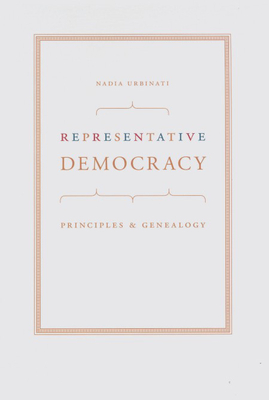

 University of Chicago Press
University of Chicago Press
Representative Democracy: Principles and Genealogy


Key Metrics
- Nadia Urbinati
- University of Chicago Press
- Paperback
- 9780226842790
- 8.9 X 5.9 X 0.8 inches
- 1.05 pounds
- Political Science > Political Ideologies - Democracy
- English
 Secure Transaction
Secure TransactionBook Description
As Urbinati shows, the idea that representation is incompatible with democracy stems from our modern concept of sovereignty, which identifies politics with a decision maker's direct physical presence and the immediate act of the will. She goes on to contend that a democratic theory of representation can and should go beyond these identifications. Political representation, she demonstrates, is ultimately grounded in a continuum of influence and power created by political judgment, as well as the way presence through ideas and speech links society with representative institutions. Deftly integrating the ideas of such thinkers as Rousseau, Kant, Emmanuel Joseph Siey�s, Paine, and the Marquis de Condorcet with her own, Urbinati constructs a thought-provoking alternative vision of democracy.
Author Bio
Nadia Urbinati (Ph.D., European University Institute, Florence, 1989) is a political theorist who specializes in modern and contemporary political thought and the democratic and anti-democratic traditions. She co-chaired the Columbia University Faculty Seminar on Political and Social Thought and was a co-editor with Andrew Arato of the academic journal Constellations: An International Journal of Critical and Democratic Theory. She is a member of the Executive Committee of the Foundation Reset Dialogues on Civilization and the Feltrinelli Foundation (Milan).
She has been a member of the School of Social Sciences of the Institute for Advanced Study, Princeton University, and a Laurance S. Rockefeller Visiting Fellowship in the University Center for Human Values, Princeton University. She is permanent visiting professor at the Scuola Superiore de Studi Universitari e Perfezionamento Sant'Anna of Pisa (Italy), and taught at Bocconi University (Milan), SciencesPo (Paris) and the University UNICAMP (Brazil).
She is the winner of the 2008-9 Lenfest/Columbia Distinguished Faculty Award. In 2008 the President of the Italian Republic awarded Professor Urbinati the Commendatore della Repubblica (Commander of the Italian Republic). In 2004 her book Mill on Democracy (cited below) received the David and Elaine Spitz Prize as the best book in liberal and democratic theory published in 2002. In 2020 her book Me the People (cited below) received the Capalbio International Prize.
Professor Urbinati is the author of Me The People: How Populism Transforms Democracy (Harvard University Press, 2019); The Tyranny of the Moderns (Yale University Press 2015); Democracy Disfigured: Opinion, Truth and the People (Harvard University Press, 2014); Representative Democracy: Principles and Genealogy (University of Chicago Press, 2006), and of Mill on Democracy: From the Athenian Polis to Representative Government (University of Chicago Press, 2002). She has edited Carlo Rosselli, Liberal Socialism (Princeton University Press, 1994); Piero Gobetti, On Liberal Revolution (Yale University Press,2002).
She co-edited several books, in particular: with Monique Canto-Sperber Le socialism libéral: Une anthologie; Europe-États-Unis (Éditions Esprit 2003); with Alex Zakaras, John Stuart Mill's Political Thought: A Bicentennial Reassessment (Cambridge University Press, 2007); with Stefano Recchia, A Cosmopolitanism of Nations: Giuseppe Mazzini's Writings on Democracy, Nation Building and International Relations (Princeton University Press, 2009); with Steven Lukes, Condorcet's Political Writing (Cambridge University Press, 2012); with Carlo Invernizzi-Accetti, Hans Kelsen’s On the Worth and Values of Democracy (Rowman & Littlefield, 2013); with Lisa Disch and Mathijs van de Sande, The Constructivism Turn in Political Representation (Edinburg University Press, 2019).
Professor Urbinati has published articles in numerous international scholarly journals and is a political columnist for Italian newspapers.
Source: Columbia University Political Science
Videos








Community reviews
Write a ReviewNo Community reviews